Key Takeaways
AI talent demand outpaces supply by 15:1 with 500,000+ positions competing for 40,000 annual graduates globally.
Senior machine learning engineers command $300,000-$600,000 packages and below-market offers guarantee immediate rejection.
Reduce hiring cycles from 45 days to 21 days using skills assessments and streamlined interviews to win candidates.
Scale teams through fractional developers, teams-as-a-service, academic partnerships, and upskilling existing engineers.
Replace generic job descriptions with specific technologies, real projects, and tech stacks to attract qualified AI professionals.
Why AI engineers Talent Is So Hard in 2025 — and How to Hire AI Talent Successfully
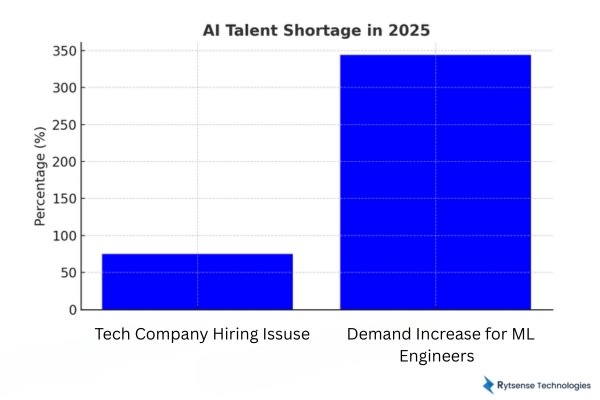
Why Hiring AI Talent Is So Hard in 2025
Explosive demand outpacing talent supply
Competition with Big Tech & global remote employers
Remote work changed everything. A company in Mumbai is now in competition for the same AI developer as a San Francisco firm. The influx of global hiring obviously created opportunities for potential companies, but it also created higher levels of competition.
Rapid evolution of AI skills and emerging specializations
Additionally, the new areas of specialization in this industry are developing at all times:
- Experts in prompt engineering
- Specialists in fine-tuning large language models (LLMs)
- Architects in agentic AI
- Engineers in AI safety
- Developers in multimodal AI
Salary + equity + innovation expectations rising
The need for equity is at an all-time high, too. AI professionals are looking for tangible product ownership in the work they produce, as well as realistic research budgets, conferences, and publication opportunities available to them.
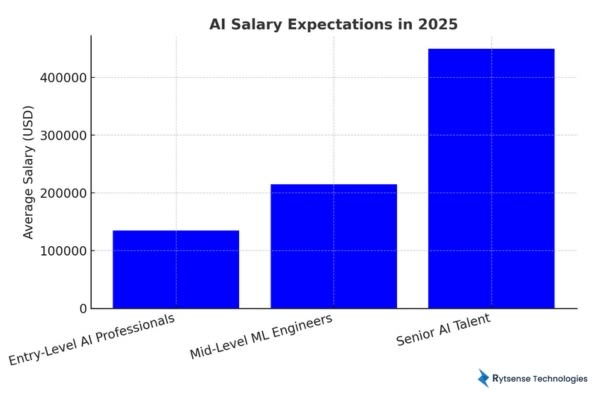
What’s Causing the AI Talent Shortage
Industry adoption of GenAI and deep learning
Generative AI changed everything. The success of ChatGPT led to the mainstream adoption of AI. Now, every CEO is seeking their own company voice and AI product. Such a universal need has placed unprecedented strain on the recruitment of AI talent.
AI experts are concentrated in limited talent pools
Most AI experts emerge from leading educational institutions. Stanford, MIT, Carnegie Mellon, Berkeley, and a small handful of global institutions produce disproportionately larger shares of AI talent. The concentration of AI talent creates a hyper-competitive environment for vendors seeking AI talent.
Ready to take your business to the next level with AI?
Contact us to explore custom AI solutions tailored for your business needs.
The Most In-Demand Skills to Hire AI Engineers
| Skill Category | Specific Capabilities | Average Salary Range |
|---|---|---|
| Machine Learning Engineering | Model architecture, training pipelines, optimization | $150,000 - $300,000 |
| Data Engineering | ETL pipelines, data warehousing, feature engineering | $130,000 - $250,000 |
| LLM & Generative AI | Fine-tuning, RAG systems, prompt engineering | $160,000 - $350,000 |
| MLOps & Deployment | Kubernetes, model monitoring, CI/CD for ML | $140,000 - $280,000 |
| AI Governance & Ethics | Bias detection, compliance, and responsible AI | $135,000 - $260,000 |
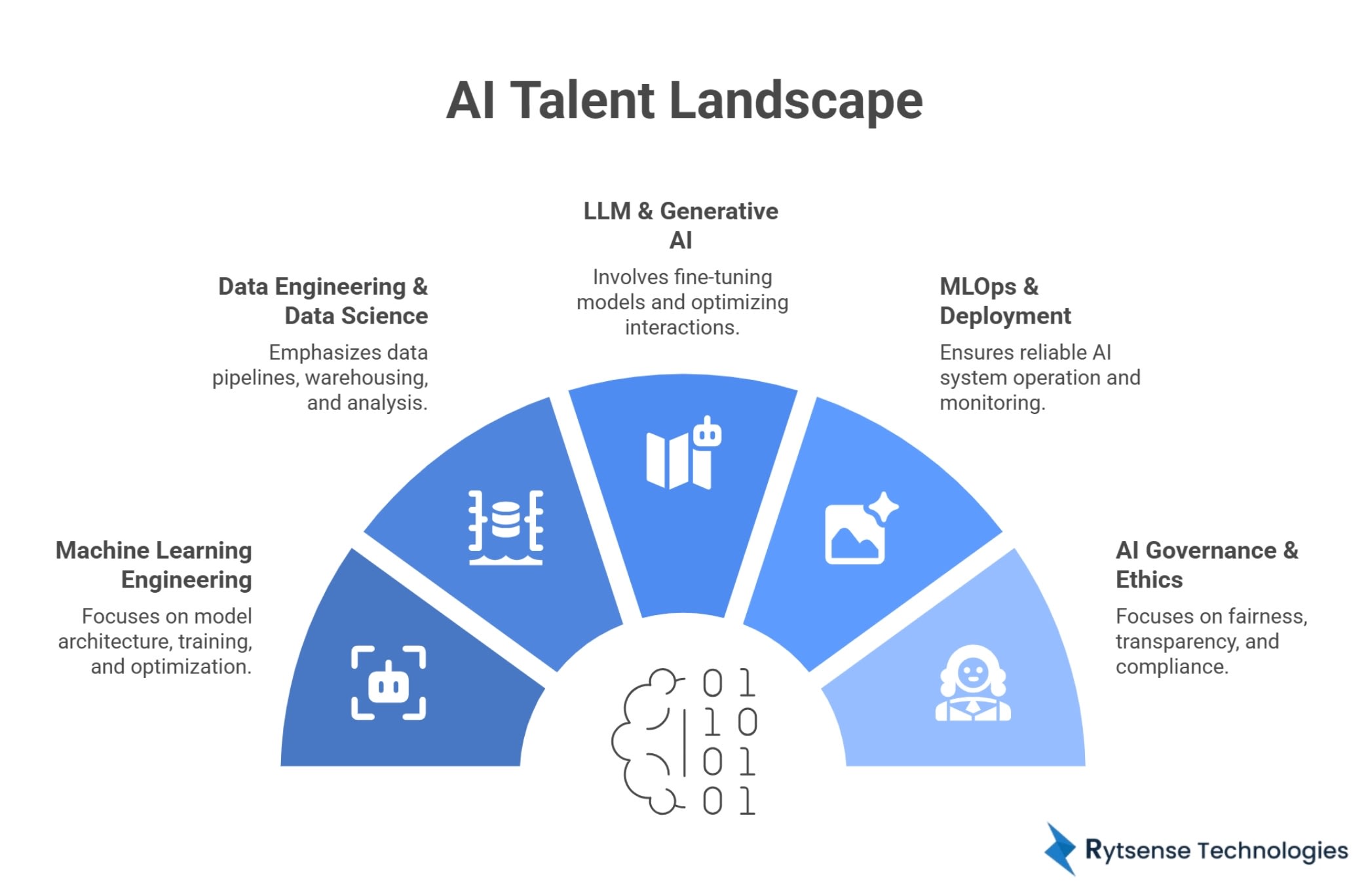
Machine Learning Engineering
When bringing in AI talent with ML experience, look for:
- Experience with deep learning frameworks (PyTorch, TensorFlow).
- Experience optimizing models and/or compression.
- Experience with distributed training.
- Knowledge of model evaluation metrics.
- Production experience with AI.
Data Engineering & Data Science
Important capabilities include:
- Develop scalable ETL pipelines.
- Feature engineering and/or feature selection.
- Monitoring data quality.
- Quantitative analysis expertise umbrella.
- Understanding organizational metrics.
LLM Fine-Tuning + Prompt Engineering
Key skills:
- Fine-tuning large language models
- Retrieval-augmented generation (RAG) systems
- Prompt optimization and testing
- Token efficiency and cost-benefit modelling
- Natural language processing fundamentals
MLOps & Cloud Model Deployment
Essential skills:
-
Container orchestration (K8s, Docker)
Versioning models and tracking experiments
Automated retraining pipelines
Monitoring performance and alerting
Cloud platforms (AWS, GCP, Azure)
AI Governance, Security & Ethics
Key Responsibilities:
- Detection and mitigation of bias
- Implementation of model explanation
- Compliance (GDPR, AI Act)
- Assessment of vulnerabilities through penetration testing
- Development of an ethical AI framework
What AI Candidates Look For When Choosing Where to Work
Meaningful and impactful projects
The talent asks:
- Will the AI initiative help real users?
- Does the company have quality training data?
- Are we building products, or research prototypes?
- What is the path from a model to a production system?
Innovation culture & autonomy
Winning cultures provide:
- Exploration of undefined or unknown solutions
- Supporting professional conferences
- Time for their research and learning
- Encouragement to participate in open-source
- Opportunities to connect with other disciplines
Pay, equity, and research incentives
Attractively competitive packages would include:
- A fair market-based salary
- Equity grants that are meaningful
- Annual learning stipend ($5k-$10k)
- Attendance at conferences
- Annual time to write and publish
- Funding to publish
Interested in developing a custom AI app for your business?
Get a free consultation with our AI experts today!
How to Fix It: Proven Strategies to Hire AI Talent Faster
You can speed up the AI recruitment process by writing clearly defined technical roles, conducting skills-based assessments, providing a 3-week interview pipeline, and presenting your innovation roadmap to show potential AI talent "what's next" and your level of technical sophistication.
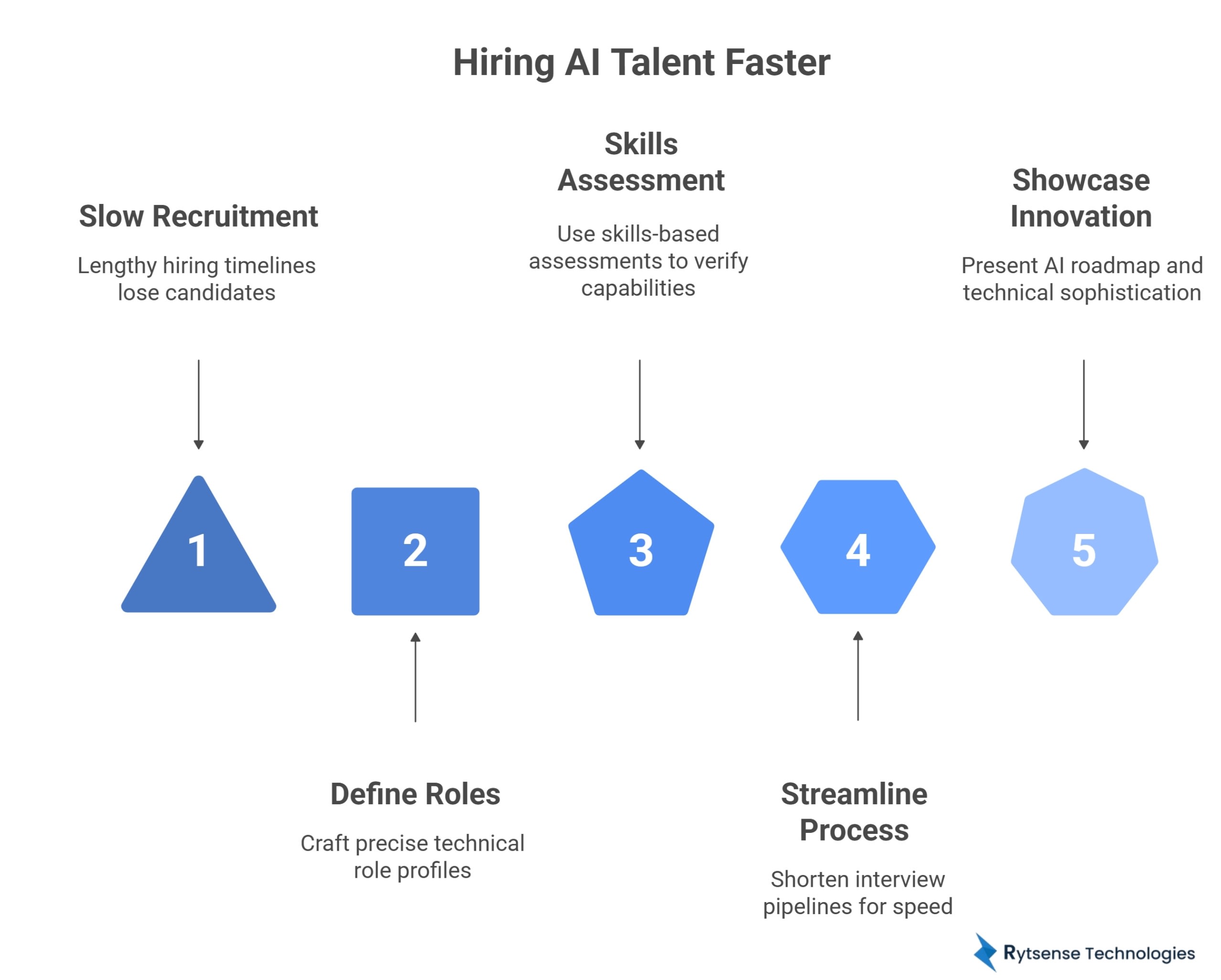
Craft precise role profiles
Generic job descriptions do not cut it. Successful companies that seek to hire AI talent do so with specificity. Which technologies are you looking for? Be explicit about your exact technical needs! What is the particular business problem you aim to solve? What is your AI system's architecture?
Job Description Composite:
- Specific AI/ML technologies needed
- Descriptions of actual projects (as opposed to buzzwords)
- Infrastructure and tech stack
- Team structure/collaboration
- Specific metrics of impact
Use skills-based assessments
Resumes and interviews deceive. Skills assessments tell the truth about the individual’s actual capabilities. When you hire an AI developer, evaluate and ascertain their performance capabilities!
Assessment Detail:
- Take-home challenge: building an ML model (4-6 hours)
- Code review and optimization task
- Designing a system for AI applications
- Evaluating and debugging a Model
- Solve a real production situation discussion
Shorten Interview Pipelines
Lengthy hiring timelines lose candidates. Top AI talent has multiple offers. It’s about speed. Reduce your time to hire from 45 days to 21 days.
Interview Process Streamlining:
- Initial screening call (30 mins)
- Technical assessment (async)
- Technical deep-dive interview (90 mins)
- Team fit and project discussion (60 mins)
- Decision on offer to hire (within 48 hours)
Showcase innovation & long-term roadmap
AI professionals want to invest in organizations when they see vision. Demonstrate to them that you have a strategy for AI. Show them the level of technical sophistication. Show them you can tackle AI challenges.
What to Show:
- Roadmap for AI products (6-18 months)
- Current AI infrastructure and plans
- Research partnerships or initiatives
- Examples of past successful AI projects
Smart Hiring Models to Help You hire ai engineers at Scale
Scale AI teams using on-demand contractors, AI teams-as-a-service, academic research partnerships, and internal upskilling programs to convert existing software engineers to specialized machine learning engineers successfully.
On-Demand AI Developers
Contract and fractional AI talent fills immediate gaps. This model provides you with flexibility. You will have access to expertise without long-term commitment.
Good Situations to Use On-Demand AI Developers (Ghosts):
- "Proof-of-concept" projects.
- Specific technical challenges.
- Seasonal capacity needs.
- Requires specialized skills: typical projects can be 6-12 weeks.
AI Teams-as-a-Service
Some AI hiring firms have a network of complete AI teams. AI teams include data engineers, ML engineers, and MLOPs professionals, working together. This model allows you to fine-tune project specifications.
AI Teams-as-a-Service Advantages (Ghosts):
- You can deploy teams quickly.
- All members have experience with one another.
- Workflows are planned (think sprints).
- Risk is less when more teams know the company and you, the customer.
- Appreciation of gradual capacity expansion.
Academic & Research Lab Partnerships
Universities are a source of cutting-edge research on AI. This modality is based on partnering with out-of-state/university/college research labs. You can be a sponsor for PhD students and develop internship pipelines.
Partnership Models (Ghosts):
- Sponsored research projects.
- Create adjunct positions at your company for the PhD students.
- Create internship programs that will blossom into hiring.
- Guest lectures.
- Building publication opportunities jointly.
Upskill Internal Tech Teams
A lot of your engineers can learn AI. If you believe you have a core that has strength, you invest in a series of learning programs. Software engineers can become machine learning engineers. Data analysts can become data scientists.
Up Skills Framework (Ghosts):
- Structured learning programs that focus on 3-6 months.
- Altering education with real projects in place.
- Mentors or experienced AI professionals.
- Support you with certifications.
- Gradual responsibility.
Not sure which AI model fits your business needs?
Talk to us about finding the perfect solution.
Common Mistakes Companies Make When Trying to Hire AI Talent
Companies sabotage their AI talent attraction by posting boilerplate job descriptions, providing below-market base salaries, screening for 1+ hours across each of 6 rounds of interviewing, and using legacy technology stacks that automatically disqualify them in the minds of the strongest AI talent.
Overly generic job descriptions
"AI Engineer" reads as vague. Be precise. Define the role. State the technology needed.
Poor Example: "Looking for an AI engineer to help build ML models"
Better Example: "Senior ML Engineer to build production recommender systems with Pytorch, deployed on AWS with real-time inference"
Lowball offers in a competitive market
Hiring AI is expensive. Face that fact. When you look to save, you will fail. Plan accordingly.
Lengthy interview cycles
Six interview rounds will lose candidates. Respect their time. Make an assertive hiring decision.
Outdated tech stacks
AI talent wants to work on modern tech, not legacy technology. Legacy and outdated tech are a massive deterrent to talent. Invest in modern infrastructure before hiring AI talent.
Why Diversity Matters When You hire ai engineers
Hiring diverse AI teams leads to promising outcomes and fairer, less biased systems, as diverse thinking is best for addressing complex problems, assessing more diverse use cases, and ultimately producing products that address broader audiences with improved robustness and inclusivity.
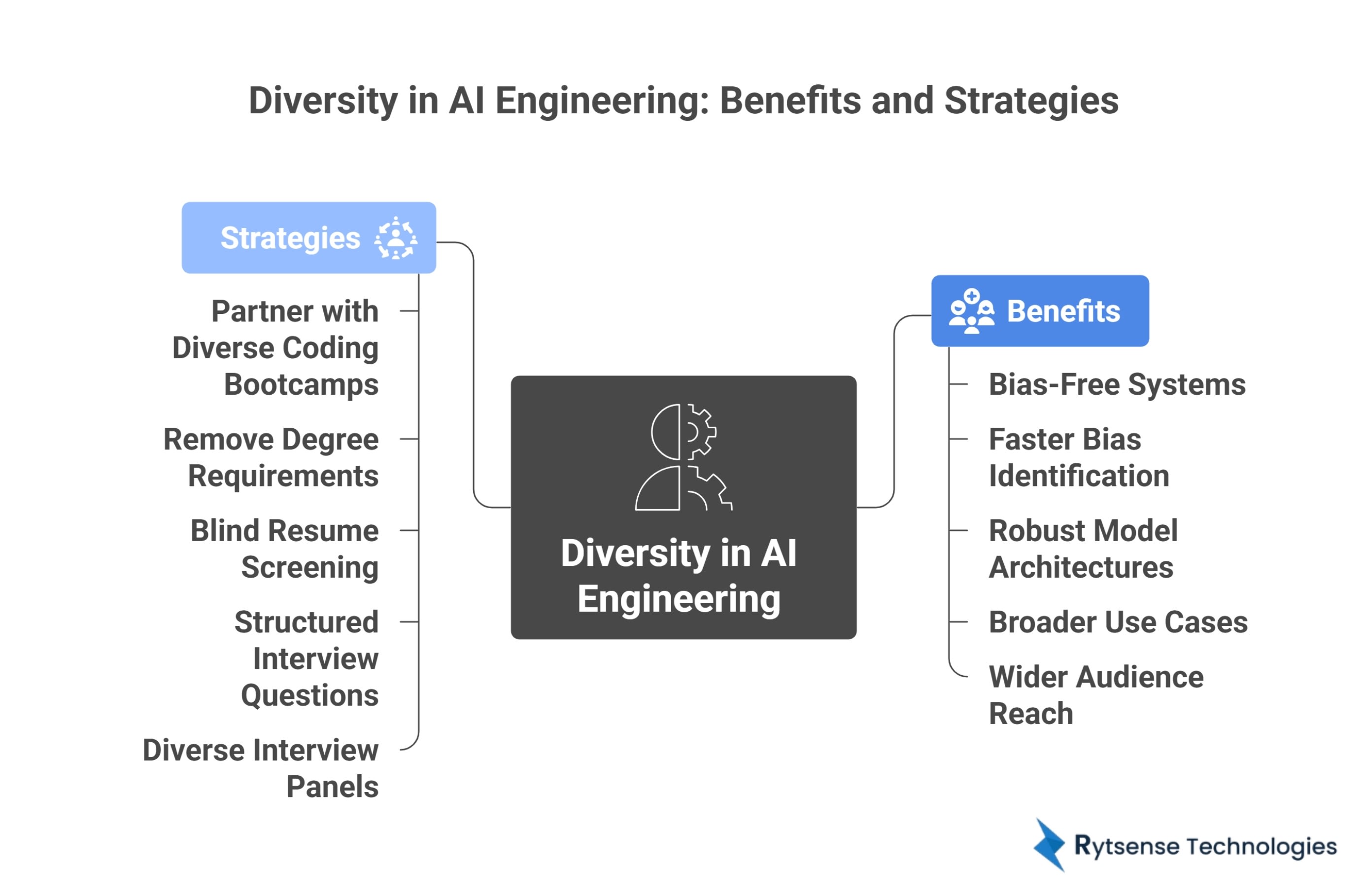
Bias-free decision systems start with diverse contributors
AI systems reflect their creators' biases. Diverse teams build fairer systems. Homogeneous teams create problematic AI.
Research shows diverse AI teams:
- Identify bias issues 40% faster
- Create more robust model architectures
- Consider broader use cases
- Deliver products serving wider audiences
Diversity Hiring Strategies:
- Partner with diverse coding bootcamps
- Remove degree requirements where possible
- Blind resume screening
- Structured interview questions
- Diverse interview panels
Want to ensure your AI app stays updated and optimized?
Reach out to our support team for continuous maintenance and monitoring.
Future Outlook: How AI Talent Roles Will Evolve
AI roles will become more about the systems that humans and AI would collaborate on together, and in order for some AI team members to flourish, continuous upskilling will be necessary, as all technology is evolving monthly and will require time to sharpen skills, attend conferences, and participate in experiments.
Rise of Hybrid AI + Human Collaboration
Roles in AI in the future will likely focus on human-AI collaboration. AI professionals will likely work on systems that enhance human skills. Pure automation may become less popular.
Continuous learning is becoming mandatory
AI is changing every month. To hire AI talent that remains engaged, it will be critical to support a learning environment. Show support to those learning to update their skills, making sure they have time to update their skills before launching into a new project.
Essential Learning Support:
- Dedicated learning time (4-6 hours weekly)
- Online course subscriptions
- Conference attendance (2-3 annually)
- Internal knowledge sharing sessions
- Experimental project allocation
Conclusion: How to Hire AI Talent and Win in 2025
Successfully hiring AI engineers in 2025 will take strategy, speed, and sophistication. Understand that the difference between hiring AI engineers and other technology positions is fundamentally different from traditional technology and STEM recruiting. Be specific about skills, provide competitive compensation, key value around leading back to meaningful work, and build an innovation culture. Conduct skills-based assessments and reduce the cycle time to hire.
Create a global hiring, fractional hires, or internal upskilling program. When appropriate, leverage the help of an AI executive search firm to help you find and complement your growing startup. Just remember that hiring new AI engineers is only the first step. Once hired, you have to retain them by offering learning opportunities and purposeful work. As companies master and implement these steps in the recruiting process, they will build the AI teams that companies will rely on in the next decade.
Meet the Author

Karthikeyan
Connect on LinkedInCo-Founder, Rytsense Technologies
Karthik is the Co-Founder of Rytsense Technologies, where he leads cutting-edge projects at the intersection of Data Science and Generative AI. With nearly a decade of hands-on experience in data-driven innovation, he has helped businesses unlock value from complex data through advanced analytics, machine learning, and AI-powered solutions. Currently, his focus is on building next-generation Generative AI applications that are reshaping the way enterprises operate and scale. When not architecting AI systems, Karthik explores the evolving future of technology, where creativity meets intelligence.